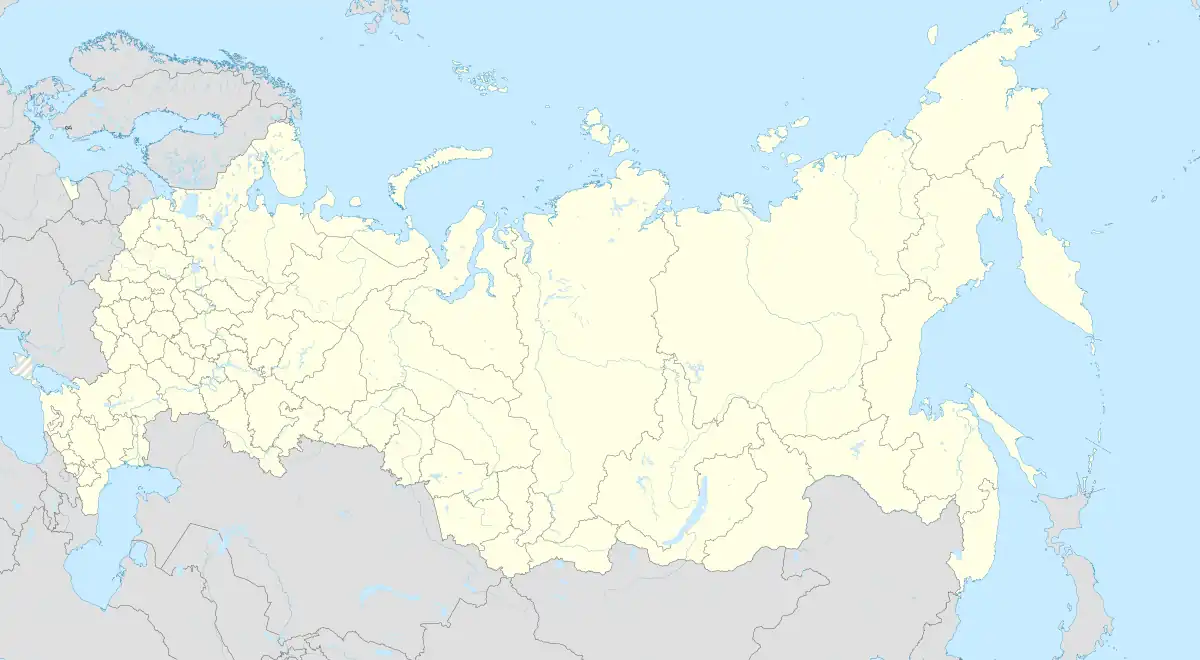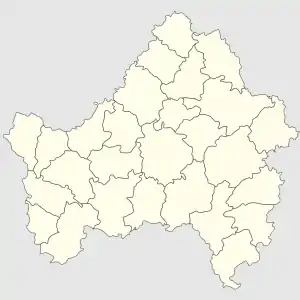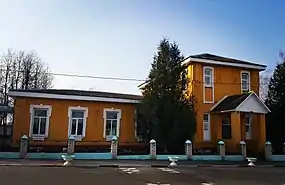Gordeyevka, Bryansk Oblast
Gordeyevka (Russian: Горде́евка) is a rural locality (a selo) in Bryansk Oblast, Russia. It is the administrative, transport, trade and economical center of Gordeyevsky District. Population: 3,109 (2010 Census);[3] 3,066 (2002 Census);[4] 2,742 (1989 Census).[5]
Gordeyevka
Гордеевка | |
|---|---|
Location of Gordeyevka | |
 Gordeyevka Location of Gordeyevka  Gordeyevka Gordeyevka (Bryansk Oblast) | |
| Coordinates: 52°57′30″N 31°58′37″E | |
| Country | Russia |
| Federal subject | Bryansk Oblast |
| Rural Settlement | Gordeyevsky Rural Settlement |
| • Municipal district | Gordeyevsky District |
| Time zone | UTC+3 (MSK |
| Postal code(s)[2] | 243650 |
| Dialing code(s) | +7 48340 |
| OKTMO ID | 15611406101 |
The selo is located in Central Russia southwest of Moscow near the border with Belarus in the west of the Bryansk Oblast.
In 2018 year the total population of the Gordeyevsky district was 10 620, with the population of Gordeyevka accounting for 28.4% of that number.
Gordeevka is one of the most comfortable and largest rural settlements in Bryansk Oblast.
Geography
Gordeyevka lies in western European Russia in the central to western parts of the East European Plain.
The relief is a typical East European Plain landscape, with alternating rolling hills and shallow lowlands, although lowlands dominate.

Climate is temperate continental. The average temperature in January is −7 to −9 °C (19 to 16 °F). The average July temperature is +18 to +19 °C (64 to 66 °F). Average annual precipitation varies from 560 to 600 millimeters (22 to 24 in).
Ecological problems
As a result of the Chernobyl disaster on April 26, 1986, part of the territory of Bryansk Oblast has been contaminated with radionuclides (mainly Gordeyevsky, Klimovsky, Klintsovsky, Krasnogorsky, Surazhsky, and Novozybkovsky Districts). In 1999, some 226,000 people lived in areas with the contamination level above 5 Curie/km2, representing approximately 16% of the oblast's population.
Administrative and municipal structure
There are 9 settlements in the Gordeevskoe rural settlement.
| Settlements of Gordeevskoe rural settlement of Bryansk Oblast | ||||
|---|---|---|---|---|
| № | Settlements name | Russian name | Type | Population (people) |
| 1 | Veliky Bor | Великий Бор | village | 33 |
| 2 | Gordeevka | Гордеевка | selo | 3014 |
| 3 | Zhovnets | Жовнец | selo | 0 |
| 4 | Zavod-Koretsky | Завод-Корецкий | village | 215 |
| 5 | Zeleniy Klin | Зелёный Клин | village | 3 |
| 6 | Medvedovka | Медвёдовка | village | 15 |
| 7 | Pokon | Поконь | village | 146 |
| 8 | Smelyy | Смелый | village | 64 |
| 9 | Shamry | Шамры | village | 6 |
Sights
Church of the Ascension in the village Veliky Bor of Gordeevskoe rural settlement of Bryansk Oblast
The supplier on the hill of intermediaries is the compositional center of his development. Year of construction of the church (by order of Count Bezborodko) - 1809. By now, the side porticos and the top of the bell tower have been lost. An interesting example of a cross-shaped manor church in the style of mature classicism. Around the building were comparatively short side arms, which were slightly protruding rectangular altars ending in a lowered semicircular apse.

The originality of the composition is given by a large light quadrangle towering over the center with a tetrahedral dome cover and a small dome on a cubic pedestal. A small refectory with one window on the side facades is adjoined by a preserved quadrangle of the bell tower. All facades of the building at the level of the apse cornice are bypassed by a profiled belt. Four Tuscan pilasters decorating the ends of the side arms correspond to the columns of the lost porticoes.
Between them in the center there are side entrances marked with triangular sandrids, and on the sides - rectangular windows; above the openings there are, respectively, an oval and two round niches. In the upper part of each facet of the quadrangle, a large semicircular three-part Empire-type window is cut. The tier of the bell tower is decorated with large flat arched niches in the center of the facets, rusticated corner parts to the waist and round niches-medallions above it. In the interior, all the side parts are completely open into the high central one, forming a single space of the temple. The central part is covered with a four-lane closed vault, the altar is covered with a conch, and the altar vima, the side arms and the refectory are covered with cylindrical vaults. The lower tier of the bell tower with rounded inner corners has a corrugated vault along the north-south axis. On the sides of the trapezoidal passage to the refectory, there are small rooms with a staircase in the southern one. Only the plaster cornices at the base of the vaults and at the top of the main quadrangle, as well as pilasters between the windows on the north and south walls, have survived from the interior decoration.
References
- "Об исчислении времени". Официальный интернет-портал правовой информации (in Russian). 3 June 2011. Retrieved 19 January 2019.
- Почта России. Информационно-вычислительный центр ОАСУ РПО. (Russian Post). Поиск объектов почтовой связи (Postal Objects Search) (in Russian)
- Russian Federal State Statistics Service (2011). Всероссийская перепись населения 2010 года. Том 1 [2010 All-Russian Population Census, vol. 1]. Всероссийская перепись населения 2010 года [2010 All-Russia Population Census] (in Russian). Federal State Statistics Service.
- Russian Federal State Statistics Service (21 May 2004). Численность населения России, субъектов Российской Федерации в составе федеральных округов, районов, городских поселений, сельских населённых пунктов – районных центров и сельских населённых пунктов с населением 3 тысячи и более человек [Population of Russia, Its Federal Districts, Federal Subjects, Districts, Urban Localities, Rural Localities—Administrative Centers, and Rural Localities with Population of Over 3,000] (XLS). Всероссийская перепись населения 2002 года [All-Russia Population Census of 2002] (in Russian).
- Всесоюзная перепись населения 1989 г. Численность наличного населения союзных и автономных республик, автономных областей и округов, краёв, областей, районов, городских поселений и сёл-райцентров [All Union Population Census of 1989: Present Population of Union and Autonomous Republics, Autonomous Oblasts and Okrugs, Krais, Oblasts, Districts, Urban Settlements, and Villages Serving as District Administrative Centers]. Всесоюзная перепись населения 1989 года [All-Union Population Census of 1989] (in Russian). Институт демографии Национального исследовательского университета: Высшая школа экономики [Institute of Demography at the National Research University: Higher School of Economics]. 1989 – via Demoscope Weekly.